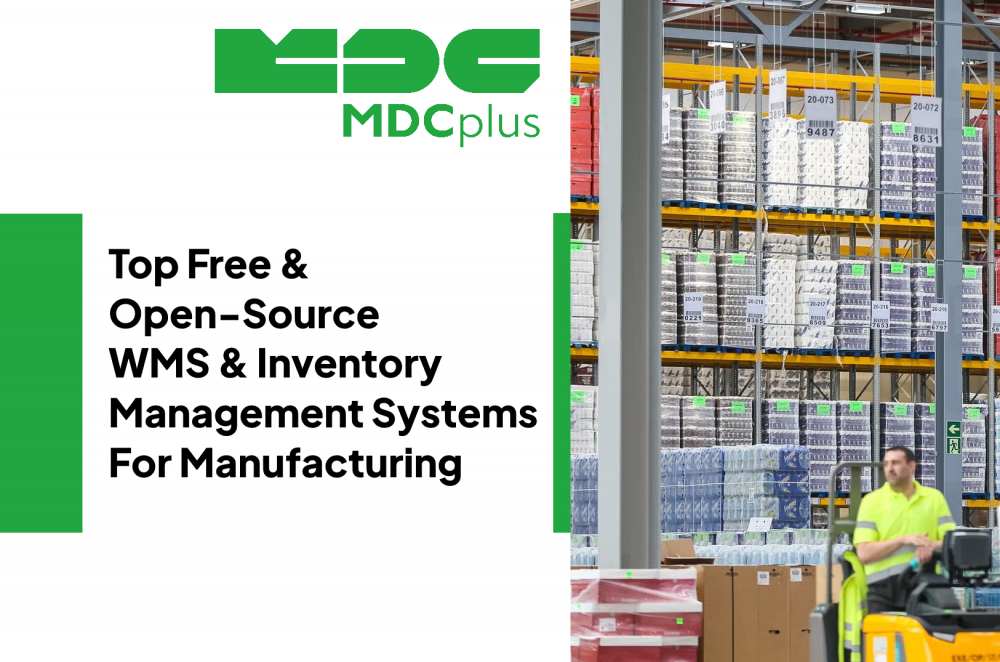Exploring free solutions? Try MDCplus
Try it yourself Get guided demoTop Free & Open-Source WMS & Inventory Management Systems for Manufacturing
Warehouse Management Systems (WMS) form a critical link between production and logistics. They ensure materials, components, and finished goods move efficiently across storage, assembly, and shipping. For manufacturers, open-source WMS platforms offer transparency, integration flexibility, and lower ownership costs while supporting real-time visibility across operations.
1. OpenBoxes
Best for: manufacturers and distributors needing robust warehouse workflows.
OpenBoxes is a mature open-source WMS originally built for healthcare supply chains but now widely adopted in manufacturing and logistics. It supports stock movement, replenishment, lot tracking, expiry management, and multi-warehouse operations. Java-based and web-deployable.
2. ERPNext (Inventory / Warehouse Module)
Best for: integrated WMS + ERP functionality.
ERPNext includes full inventory and warehouse management features with item serialization, valuation, and stock reconciliation. It’s open-source, browser-based, and integrates natively with MRP, accounting, and CRM modules — ideal for vertically integrated factories.
3. Odoo Community Edition (Inventory App)
Best for: modular deployments linking inventory, MRP, and sales.
Odoo’s Inventory module handles routing, putaway rules, and barcode scanning. It supports FIFO/LIFO costing, batch tracking, and mobile integration. A strong open-source WMS when combined with Odoo’s manufacturing and purchase modules.
4. Dolibarr ERP & CRM
Best for: small manufacturers or workshops.
Dolibarr’s stock and warehouse modules include product management, supplier integration, and order tracking. It’s PHP/MySQL-based, lightweight, and easily hosted. Suitable for SMEs that want a simple inventory backbone.
5. OFBiz (Apache Software Foundation)
Best for: customizable enterprise-grade WMS/ERP stack.
Apache OFBiz provides a powerful WMS as part of its open-source ERP. It supports warehouse routing, order picking, and integration with manufacturing modules. Java-based, scalable, and widely used in large-scale deployments.
6. OpenWMS.org
Best for: developers seeking modular microservice-based WMS.
OpenWMS.org is an open-source warehouse management and logistics framework written in Java and Spring. It supports warehouse topology modeling, transport orders, and asynchronous processing. Designed for high-volume automation scenarios.
7. Snipe-IT
Best for: asset and spare parts tracking within maintenance operations.
Snipe-IT is an open-source asset management system often used alongside CMMS. It supports barcode scanning, inventory audits, and asset lifecycle tracking — a practical lightweight alternative for maintenance and tool management.
8. PartKeepr
Best for: electronics and component inventory management.
PartKeepr is an open-source system tailored for managing small parts, components, and consumables. Though created for electronics labs, it’s suitable for tracking spare parts in manufacturing maintenance or assembly lines.
9. iDempiere
Best for: enterprises wanting unified ERP + WMS + manufacturing.
iDempiere offers complete warehouse, logistics, and order fulfillment functionality as part of its ERP framework. Supports multiple storage types, picking optimization, and supply chain integration. Built on Java, PostgreSQL, and open standards.
10. inoERP
Best for: Oracle-style inventory and procurement workflows.
inoERP is a PHP-based open-source ERP system with strong WMS features — lot tracking, purchase receipt, and supplier collaboration. Its architecture mimics legacy Oracle systems but remains lightweight and easy to deploy.
Free EMS Comparison Table
| Platform | Stack | License | Core Strength | Ideal For | Community Activity |
|---|---|---|---|---|---|
| OpenBoxes | Java / MySQL | MPL | Multi-warehouse, lot tracking | Mid-size manufacturers | High |
| ERPNext | Python / MariaDB | GPLv3 | Integrated ERP + WMS | SMEs / integrated factories | Very High |
| Odoo CE | Python / PostgreSQL | LGPLv3 | Modular WMS + ERP | Growing manufacturers | Very High |
| Dolibarr | PHP / MySQL | GPLv3 | Simple stock control | Small firms | High |
| Apache OFBiz | Java / PostgreSQL | Apache 2.0 | Enterprise-grade WMS | Large enterprises | Medium |
| OpenWMS.org | Java / Spring | MIT | Microservice WMS framework | Automation-heavy sites | Medium |
| Snipe-IT | PHP / MySQL | GPLv3 | Asset / tool tracking | Maintenance, CMMS | Very High |
| PartKeepr | PHP / MySQL | GPLv3 | Component inventory | Electronics / spare parts | Medium |
| iDempiere | Java / PostgreSQL | GPLv2 | ERP + WMS integration | Enterprises | Medium |
| inoERP | PHP / PostgreSQL | GPLv3 | Oracle-style inventory | Legacy system users | Low |
Recommendations
For manufacturers needing full WMS functionality, OpenBoxes and ERPNext stand out — they’re stable, well-documented, and proven in real deployments.
If your factory already uses Odoo or iDempiere, leveraging their built-in inventory modules offers seamless integration with production and accounting. Developers building custom logistics layers should consider OpenWMS.org for its API-driven architecture.
For maintenance and spare-part tracking, Snipe-IT or PartKeepr deliver simple, reliable results without the overhead of full ERP. Dolibarr and inoERP provide entry-level flexibility for small or distributed factories.
In 2025, open-source WMS platforms are mature enough to manage industrial-scale warehouse operations. Whether integrated with MES/ERP or deployed standalone, tools like OpenBoxes, ERPNext, and Odoo CE bring visibility and traceability across supply and production chains — all without vendor lock-in. Combining them with MDCplus or MES data enables real-time material flow visibility and data-driven decision-making on the factory floor.
About MDCplus
Our key features are real-time machine monitoring for swift issue resolution, power consumption tracking to promote sustainability, computerized maintenance management to reduce downtime, and vibration diagnostics for predictive maintenance. MDCplus's solutions are tailored for diverse industries, including aerospace, automotive, precision machining, and heavy industry. By delivering actionable insights and fostering seamless integration, we empower manufacturers to boost Overall Equipment Effectiveness (OEE), reduce operational costs, and achieve sustainable growth along with future planning.
Ready to increase your OEE, get clearer vision of your shop floor, and predict sustainably?
Other articles
While both involve structured review and analysis, their objectives, scope, and outcomes differ significantly. This article exploring this topic further.
